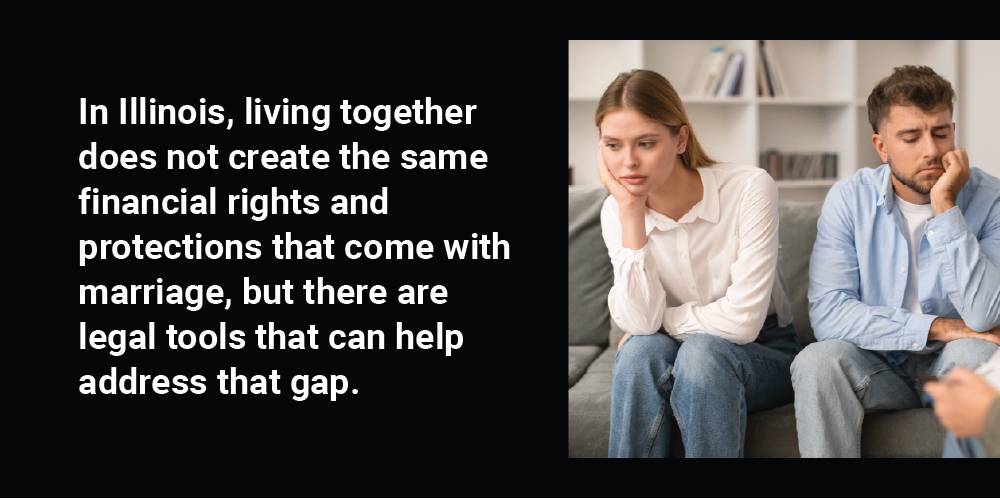Illinois Does Not Recognize Palimony, Shared Property Rights of Cohabitants
 "Palimony" is a term sometimes used after an unmarried couple who lives together has ended a long-term relationship. There are different definitions for palimony because it is not an official legal term. It is just a combination of the words "pal" and "alimony."
"Palimony" is a term sometimes used after an unmarried couple who lives together has ended a long-term relationship. There are different definitions for palimony because it is not an official legal term. It is just a combination of the words "pal" and "alimony."
The basic definition of palimony is that it is the equivalent of spousal maintenance, or alimony, for unmarried couples. Some expand that definition to include each party’s right to shared assets from the relationship.
Illinois family law does not recognize palimony as a right between unmarried couples in 2026 the way it does recognize spousal support as a right between married couples. Instead, you can establish property claims by creating a cohabitation agreement. Our Kane County family lawyers can help.
Palimony Rulings in Illinois
A 1979 Illinois Supreme Court ruling on the case of Hewitt v. Hewitt is often cited as a landmark decision that set the precedent on issues like palimony. In the 1979 case, the Illinois Supreme Court found that living together does not give people the same rights to property as if they were married.
The Supreme Court was asked to reconsider this ruling in 2016 with the case of Blumenthal v. Brewer. It upheld its original decision: Unmarried partners simply do not have the property rights that married couples do.
Can Unmarried Partners Ever Recover Money or Property When They Break Up?
Illinois does not allow palimony, but that does not mean unmarried partners have no legal options at all. The most important fact is that these cases are not handled under divorce or family law rules. Instead, they are handled under regular civil law.
If you and your partner were not married, a court will not divide property based on fairness the way it does in a divorce. However, a court may still look at who legally owns the property and whether one person was unfairly enriched at the other’s expense.
For example, a court may consider claims based on contract law or property law, such as unjust enrichment or claims tied to legal ownership. These cases are more limited and harder to prove than divorce claims, but they can exist.
Illinois courts have made clear, starting with Hewitt v. Hewitt, that unmarried partners do not gain marital rights simply by living together. However, that does not erase normal ownership rights under Illinois property law.
Do Unmarried Couples with Kids Need to Pay Child Support When They Break Up?
You do not need to be married to have a right to child custody or an obligation to pay child support. Unmarried co-parents must also settle these issues when they break up. Both child custody and child support are based on the legal relationship between a parent and a child.
Are You Both Recognized as Your Child’s Legal Parent?
If both parents are recognized as the legal parents, Illinois law requires each parent to financially support their child. Child support is calculated under the Illinois Marriage and Dissolution of Marriage Act using an income shares model. This system looks at both parents’ incomes and how much time the child spends with each parent to calculate support payments.
What if Only One of Us is Our Child’s Parent?
Child support and child custody cannot be ordered until legal parentage is established. This may require:
-
Adoption
-
A Voluntary Acknowledgment of Paternity
-
A court order establishing parentage
Once parentage is established, a court can order child support, parenting time (visitation), and decision-making responsibilities (custody).
How Are Jointly Owned Assets Divided After a Breakup?
If both partners’ names are on a piece of property, such as a house or bank account, Illinois law generally treats them as co-owners. In those situations, the property is usually divided based on ownership interests, not fairness.
For example, if both names are on a deed, either person may ask a court to divide or sell the property through a legal process known as a partition action. The court’s role is to divide the property according to ownership, not to weigh who "deserves" more.
This is very different from divorce, where courts apply the Illinois Marriage and Dissolution of Marriage Act. Because unmarried couples do not have access to those divorce laws, planning ahead with a shared title or a written agreement is often the only way to avoid disputes later.

Cohabitation Agreements for Unmarried Couples
Bowling Green University estimates that over 20 million people are living together unmarried in the U.S. If you are one of these people, you may be wondering: How do you protect yourself financially if you break up with your live-in partner?
One simple way is to make sure both of your names are on all of your shared assets. This includes:
-
Homes
-
Cars
-
Household items
-
Bank accounts
-
Credit cards
Another very important way is to create a cohabitation agreement, which is similar to a prenuptial agreement in a marriage. In a cohabitation agreement, you and your partner sign a written contract that clearly explains who owns what during the relationship. You can also say what happens to property, money, and debts if you break up.
A cohabitation agreement can address issues such as:
-
How shared expenses are paid
-
How jointly purchased property is divided
-
Whether one partner must be reimbursed for financial contributions made by the other partner
Because Illinois does not recognize palimony, this type of agreement can be one of the only ways to clearly protect your financial interests outside of marriage.
Contact a Kane County Family Law Lawyer
Without automatic property rights from marriage, people who live together need to work in advance to protect their property rights. A St. Charles family law attorney at Goostree Law Group can help you create a cohabitation agreement. Schedule a free consultation by calling 630-584-4800.












